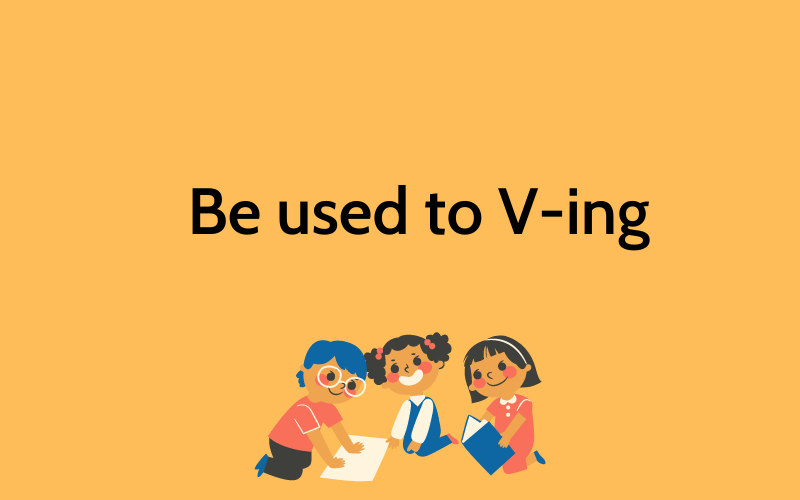Cấu trúc used to xuất hiện rất nhiều trong những câu giao tiếp tiếng Anh thông dụng. Chính vì thế, trong bài viết này duhoctms.edu.vn sẽ chia sẻ cho bạn tất cả những kiến thức về dạng cấu trúc used to. Cùng tìm hiểu các bạn nhé!
1. Khái niệm về used to
“Used to” nếu được sử dụng riêng lẻ sẽ có nghĩa là từng, đã từng.
Cấu trúc used to là cấu trúc ngữ pháp tiếng Anh được dùng để nói về một sự kiện đã xảy ra trong quá khứ và đã kết thúc ở hiện tại. Việc sử dụng cấu trúc này còn giúp nhấn mạnh sự khác biệt giữa quá khứ và hiện tại.

Ví dụ minh hoạ:
Lan used to live near my house.
Lan đã từng sống cạnh nhà tôi.
2. Cấu trúc Used to trong tiếng Anh
2.1. Công thức
| Khẳng định (+) | S | used | to V | ||
| Phủ định (-) | S | did | not | use | to V |
| Nghi vấn (?) | Did | S | use | to V? |
2.2. Cách sử dụng
Cấu trúc used to hay cấu trúc used to V được sử dụng để nói về một thói quen, một hành động, sự kiện hoặc trạng thái đã từng xảy ra trong quá khứ và không còn xảy ra trong hiện tại nữa.
Đôi khi nó còn được sử dụng để nhấn mạnh về sự khác biệt giữa hiện thực và quá khứ.
2.3. Ví dụ minh hoạ
Thể khẳng định (+)
- He used to be a long distance runner when he was young
Dịch nghĩa: Anh ấy đã từng là vận động viên chạy bền hồi còn trẻ.
- There used to be a cinema here
Dịch nghĩa: Ở đây từng có một rạp chiếu phim
Thể phủ định (-)
- I didn’t use to go swimming
Dịch nghĩa: Trước kia tôi không thường đi bơi
- She didn’t use to drink that much coffee
Dịch nghĩa: Trước kia cô ấy không uống nhiều cafe như vậy
Nghi vấn (?)
- Did he use to smoke?
Dịch nghĩa: Trước kia anh ta có hút thuốc không?
- Did you use to eat meat before becoming a vegetarian?
Dịch nghĩa: Trước khi trở thành người ăn chay thì bạn có ăn thịt không?
2.4. Một số lưu ý
1. Phủ định của cấu trúc used to V có thể được viết dưới dạng used not to V.
Ví dụ minh hoạ:
- I used not to go swimming.
- She used not to drink that much coffee.
2. Không có thì hiện tại với cấu trúc used to V trong tiếng Anh. Để nói về một thói quen trong hiện tại, ta sử dụng các trạng từ tần suất (usually, always, often, never,…)
3. Used hay use?
Khi trong câu không có “did”, ta sử dụng “used to” (có d). Khi trong câu có “did”, ta sử dụng“use to” (không có d)
3. Cấu trúc Be used to V-ing trong tiếng Anh
3.1. Công thức
| Khẳng định (+) | S | be (is, are,…) | used | to V-ing/danh từ. | |
| Phủ định (-) | S | be (is, are,…) | not | used | to V-ing/danh từ. |
| Nghi vấn (?) | Be (is, are,…) | S | used | to V-ing/danh từ? |
3.2. Cách sử dụng

Cấu trúc be used to V-ing được sử dụng để diễn tả ai đó đã từng làm 1 việc gì đó nhiều lần và đã có kinh nghiệm, không còn quá lạ lẫm với việc đó nữa.
3.3. Ví dụ minh hoạ
Khẳng định (+)
- I am used to being lied to
Tôi đã quen với việc bị nói dối rồi
- He is used to working late
Anh ấy đã quen với việc làm việc muộn
Phủ định (-)
- He wasn’t used to the heat and he caught sunstroke
Anh ấy không quen với cái nóng và bị bỏng nắng
- We aren’t used to taking the bus
Chúng tôi không quen với việc đi xe bus
Nghi vấn (?)
- Is she used to cooking?
Cô ấy có quen với việc nấu ăn không?
- Are you used to fast food?
Bạn có quen ăn đồ ăn nhanh không?
4. Cấu trúc Get used to V-ing
4.1. Công thức
| Khẳng định (+) | S | get used | to V-ing/ danh từ. | ||
| Phủ định (-) | S | do | not | get used | to V-ing/ danh từ. |
| Nghi vấn (?) | Do | S | get used | to V-ing/ danh từ? |
4.2. Cách sử dụng
Cấu trúc get used to V-ing được sử dụng để diễn tả ai đó đang dần quen 1 vấn đề hoặc sự việc nào đó.
4.3. Ví dụ minh họa
Thể khẳng định (+)
- You might find it strange at first but you will soon get used to it
Dịch nghĩa: Bạn có thể cảm thấy lạ lẫm lúc đầu nhưng rồi bạn sẽ quen với điều đó
- After a while Jane didn’t mind the noise in the office; she got used to it
Dịch nghĩa: Sau một thời gian Jane đã không còn cảm thấy phiền bởi tiếng ồn nơi công sở. Cô ấy đã quen với nó
Thể phủ định (-)
- He wasn’t used to working such long hours when I started his new job
Dịch nghĩa: Anh ấy từng không thể làm quen với việc làm việc trong thời gian dài khi mới bắt đầu công việc
- We couldn’t get used to the noisy neighborhood, so we moved
Dịch nghĩa: Chúng tôi đã không thể quen với tiếng ồn của hàng xóm, vậy nên chúng tôi chuyển đi
Thể nghi vấn (?)
- Has your sister gotten used to his new boss?
Dịch nghĩa: Em gái của bạn đã quen với sếp mới chưa?
- Have Tom got used to driving on the left yet?
Dịch nghĩa: Tom đã quen với việc lái xe bên tay trái chưa?
4.4. Một số lưu ý
1. Cả hai cấu trúc ‘be used to’ và ‘get used to’ đều theo sau bởi danh từ hoặc danh động từ (động từ thêm đuôi -ing)
2. ‘Be used to’ và ‘get used to’ có thể được sử dụng ở tất cả các thì, chia động từ phù hợp cho từng thì.
Ví dụ minh hoạ:
- You will soon get used to living alone.
- When we lived in Bangkok, we were used to hot weather.
- I have been getting used to snakes for a long time.
5. Bài tập về cấu trúc Be used to, Used to V, Get used to trong tiếng Anh
Bài tập
Bài 1: Hoàn thành các câu dưới đây
1. Liz …. a motorbike, but last year she sold it and bought a car.
2. We came to live in London a few years ago. We …. in Leeds.
3. I rarely eat ice-cream now, but I …. it when I was a child.

4. Jim …. my best friend, but we aren’t good friend any longer.
5. It only takes me about 40 minutes to get to work now that the new roadis open. It …. more than an hour.
6. There …. a hotel near the airport, but it closed a long time ago.
7. When you lived in New York, …. to the theatre very often?
Bài 2: Hoàn thành các câu sau
1. European drivers find it difficult to _______________________ (drive) on the left when they visit Britain.
2. See that building there? I _______________________ (go) to school there, but now it’s a factory.
3. I’ve only been at this company a couple of months. I _______________________ (still not) how they do things round here.
4. When I first arrived in this neighbourhood, I _______________________ (live) in a house. I had always lived in apartment buildings.
5. Working till 10pm isn’t a problem. I _______________________ (finish) late. I did it in my last job too.
6. I can’t believe they are going to build an airport just two miles from our new house! I will _______________________ (never) all that noise! What a nightmare.
7. His father _______________________ (smoke) twenty cigars a day – now he doesn’t smoke at all!
8. Whenever all my friends went to discos, I _______________________ (never go) with them, but now I enjoy it.
9. I _______________________ (drive) as I have had my driving licence almost a year now.
When Max went to live in Italy, he _______________________ (live) there very quickly. He’s a very open minded person.
Bài 3: Chọn đáp án đúng
1 – I like it now, but I ____.
A. didn’t use to
B. didn’t used to
2 – I find it hard _____ to the dark evenings in winter.
A. used
B. get used
C. to get used
3 – It took me a while to get used to ____ on a continental keyboard.
A. type
B. typing
4 – I _____ to being spoken to like that!
A. am not used
B. don’t get used
C. used
5 – I ____ play football on Saturdays when I was at school.
A. was used to
B. used to
6 – Before I started cycling, I _____ go to work by bus.
A. used to
B. got used to
7 – I haven’t studied for ages and I’m finding it hard to get used to _____ every day.
A. study
B. studied
C. studying
8 – I couldn’t _____ used to the food.
A. because
B. get
9 – He never _____ behave like that.
A. used
B. used to
10 – It’s taking me a long time to ____ speaking Norwegian.
A. used to
B. get used to
Bài 4: Điền từ vào chỗ trống
1. I didn’t … to do much skiing.
2. We … to walk to school when we were children.
3. They … not to let women join this club.
4. There … to be a lake here years ago.
5. John didn’t … to like Mary when they were teenagers.
6. When … they to live here?
7. Why did you … to use this old photocopier?
8. We never … to have electricity in our house.
9. I hardly ever … to have time for going out.
10. Did they … to let you smoke in cinemas?
Bài 5: Chọn cấu trúc câu
1. When I started to work here I needed a lot of help, but now I (am used to doing/ used to do/ get used to doing) all the work on my own.
2. He (was used to reading/used to read/got used to reading) several books a month, but he doesn’t have time anymore.
3. We were surprised to see her driving – she (got used to driving/was used to driving/didn’t use to drive) when we first met her.
4. Don’t worry, it’s a simple program to use. You (are used to/will get used to/used to use) it in no time, I’m sure.
5. When I had to commute to work every day I (used to get up/used to getting up) very early.
6. I’m afraid I’ll never (get used to living/used to live/got used to living) in this place. I simply don’t like it and never will.
7. Whenever we came to Coventry we always (used to stay/got used to staying) in the Central Hotel. We loved it.
8. When Pete Smith was the head of our office everything (got used to be/used to be/was used to being) well organized. Now it’s total chaos here.
9. Mr. Lazy was shocked when he joined our busy company because he ( wasn’t used to/didn’t use to) doing much work everyday.
10. At first the employees didn’t like the new open-space office, but in the end they (got used to/get used to/are used to) it.
Bài 6: Sử dụng cấu trúc used to + + a suitable verb để hoàn thành các câu dưới đây.
1. Diane don’t travel much now. She used to travel a lot, but she prefers to stay at home these days.
2. Liz …. a motorbike, but last year she sold it and bought a car.
3. We came to live in London a few years ago. We …. in Leeds.
4. I rarely eat ice-cream now, but I …. it when I was a child.
5. Jim …. my best friend, but we aren’t good friend any longer.
6. It only takes me about 40 minutes to get to work now that the new roadis open. It …. more than an hour.
7. There …. a hotel near the airport, but it closed a long time ago.
8. When you lived in New York, …. to the theatre very often?
Bài 7: Sử dụng cấu trúc “used to”, “be used to” or “get used to” để hoàn thành các câu sau
1. European drivers find it difficult to _______________________ (drive) on the left when they visit Britain.
2. See that building there? I _______________________ (go) to school there, but now it’s a factory.
3. I’ve only been at this company a couple of months. I _______________________ (still not) how they do things round here.
4. When I first arrived in this neighbourhood, I _______________________ (live) in a house. I had always lived in apartment buildings.
5. Working till 10pm isn’t a problem. I _______________________ (finish) late. I did it in my last job too.
6. I can’t believe they are going to build an airport just two miles from our new house! I will _______________________ (never) all that noise! What a nightmare.
7. His father _______________________ (smoke) twenty cigars a day – now he doesn’t smoke at all!
8. Whenever all my friends went to discos, I _______________________ (never go) with them, but now I enjoy it.
9. I _______________________ (drive) as I have had my driving licence almost a year now.
10. When Max went to live in Italy, he _______________________ (live) there very quickly. He’s a very open minded person.
Đáp án
Bài 1
| 1. used to have 2. used to live 3. used to eat 4. used to be | 5. used to take 6. used to be 7. used to use to go |
Bài 2
| 1. get used to driving 2. used to go 3. am still not used to 4. used to live 5. am used to finishing | 6. never get used to 7. used to smoke 8. never used to go 9. am used to driving 10. got used to living |
Bài 3
| 1. A 2. C 3. B 4. A 5. B | 6. A 7. C 8. B 9. B 10. B |
Bài 4
| 1. use | 2. used | 3. used | 4. used | 5. use | 6. did … use | 7. use | 8. used | 9. used | 10. use |
Bài 5
1. am used to doing
2. used to read
3. didn’t use to drive
4. will get used to
5. used to get up
6. get used to living
7. used to stay
8. used to be
9. wasn’t used to
10. got used to
Bài 6
| 2. used to have | 3. used to live | 4. used to eat | 5. used to be |
| 6. used to take | 7. used to be | 8. used to use to go |
Bài 7
Question 1: get used to driving.
Question 2: used to go.
Question 3: am still not used to.
Question 4: used to live.
Question 5: am used to finishing.
Question 6: never get used to.
Question 7: used to smoke.
Question 8: never used to go.
Question 9: am used to driving.
Question 10: got used to living.
Trên đây là phân loại và cách sử dụngdùng toàn bộ các kiến thức về cấu trúc used to trong tiếng Anh. Đây là một phần ngữ pháp cực kỳ quan trọng mà bất cứ ai cũng phải quan tâm. Duhoctms.edu.vn hy vọng bài viết trên đã giúp các bạn nắm được những nội dung cơ bản nhất của bài học. Chúc các bạn học tốt cấu trúc ngữ pháp này!
Xem thêm các bài viết khác:
- Adverb Key – Các loại trạng từ trong tiếng Anh
- Câu điều kiện: Công thức, cách dùng và bài tập
- Thì tương lai hoàn thành tiếp diễn (Future perfect continuous tense)
- Thì hiện tại đơn (Simple Present)
- Số thập phân, phân số, phần trăm trong tiếng Anh
- Câu tường thuật: Cấu trúc, cách dùng, bài tập
- Câu phức (Complex Sentence)

Bình luận